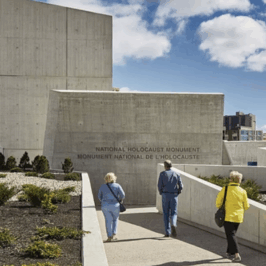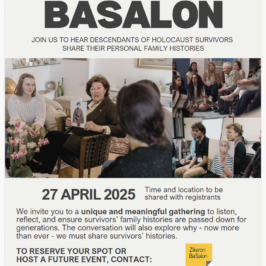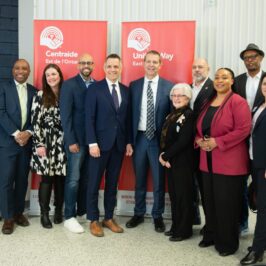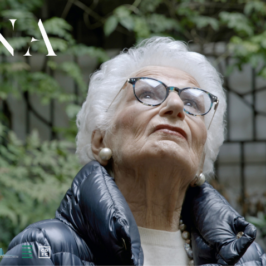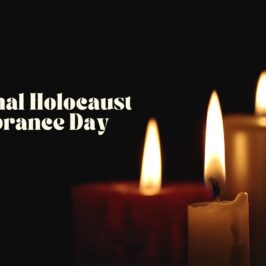By Benita Siemiatycki
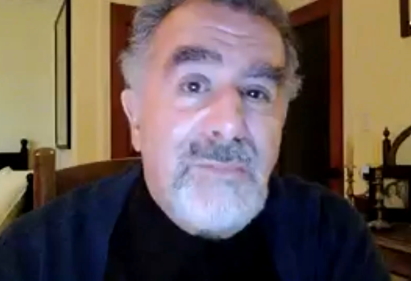
On November 9th, CHES hosted its inaugural 2021 Holocaust Education Month (HEM) event with a presentation entitled “All in the Telling” by the acclaimed Canadian actor, writer, and filmmaker Saul Rubinek. Speaking virtually from his home in Los Angeles, Rubinek presented a moving portrayal of his survivor parents, Frania and Israel, and his own experiences growing up in Ottawa as the child of Holocaust survivors.
The event, which drew over 1,000 registrants from across Canada and the United States, opened with remarks from CHES Chair Mina Cohn, who welcomed viewers and emphasized the importance of Holocaust education in light of a world-wide resurgence of antisemitism.
This theme was echoed by all the speakers: Prime Minister Justin Trudeau; Honourable Irwin Cotler, founder and chair of the Raoul Wallenberg Centre for Human Rights and Canada’s Special Envoy on Preserving Holocaust Remembrance and Combatting Antisemitism; Mayor Jim Watson; and the Embassy of Israel through a message delivered by emcee Abigail Bimman.
Dr. Gerry Pulvermacher, the Honorary Chair of the event and a child of survivors who was born in the Bergen-Belsen concentration camp, introduced Rubinek. He explained that he accepted the role of because of his commitment to “Never Again” and his deep sense of obligation to make this world a tolerant place for all.
The event took place on the 83rd anniversary of Kristallnacht, but Rubinek said that while his talk was not specifically about Kristallnacht, nevertheless it had everything to do with that infamous incident because the life of European Jews became much more perilous on that day, leading eventually to the stories he would share.
For over an hour, Rubinek delivered a moving, disturbing, yet entertaining description of his parents’ story during and after the war, as well as his approach to telling his two children about the Holocaust and what happened to their grandparents.
Deeply in love, Frania and Israel married at the age of 21 during the German occupation of Pinczow, Poland, his parents’ hometown. Rubinek, a master storyteller, wove together his family history spanning three generations in narratives playing himself and each of his parents, as well as other people relevant to the story. He included clips from a 1986 CBC documentary he produced when he took his parents to Pinczow to relive their war years. The documentary is entitled “So Many Miracles” and refers to Frania’s oft-repeated words that every step of their survival was the result of “so many miracles”. Her belief that she and Israel survived because of miracles would dominate her reflections on the past. She was forever grateful that at least they went through the despair together. Israel, however, had a different view. “I believe in G-d, but I’ll take him to court,” said Rubinek, mimicking his father.
The documentary follows the parents as they recall life before the war, showing their son where they lived, and describing the Nazi takeover of the town. They visited the farm where Zofia Brania, her husband Ludwig, and their son Maniek, who was six years old when the Rubineks arrived, hid Frania and Israel for 28 months. The Branias were recognized by Yad Vashem as Righteous Among the Nations.
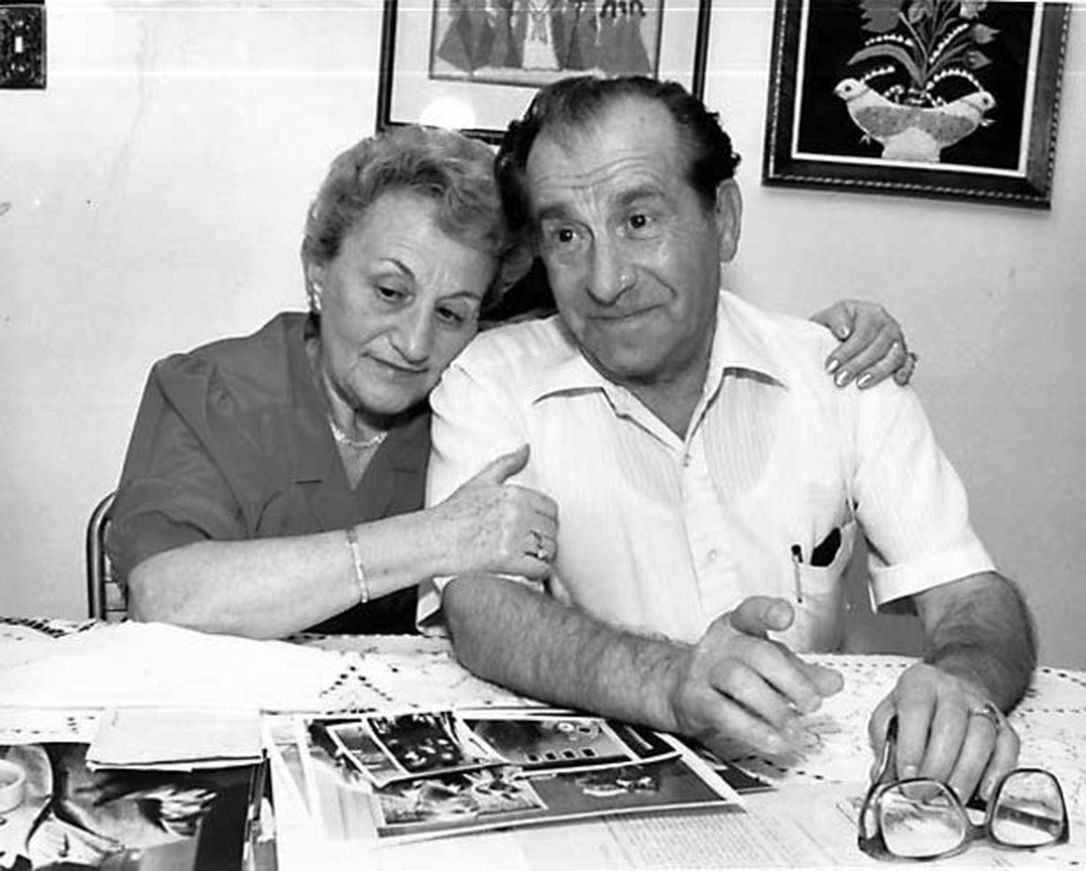
At the time of the taping, Zofia was 83 and widowed. She described their circumstances while hiding the Jews, the fear that haunted them, and her husband’s reluctance to continue. Maniek, aged 50 at the time of the filming, shared his memories of hiding Jews, and the fears for their lives that went along with it. The Rubineks’ and Branias’ friendship endured throughout the rest of their lives.
The families knew each other because the Rubineks owned a store which served the farming community, and Zofia was a regular customer. Her family had little money, and Frania often gave her credit so that she could obtain what she needed. Zofia always remembered the kindness of the Rubineks and sought them out to offer safety. As Rubinek says, that little store saved his parents’ lives. Sadly, Frania was eight months pregnant when she arrived at the Brania farm, later giving birth to a baby daughter who lived for less than an hour.
Rubinek tells a humorous story of his book’s inception, also entitled “So Many Miracles”. He was in love with a non-Jewish woman, much to his father’s dismay. Their communication was non-existent, and Rubinek was looking for a way to bridge the gap so his father would speak to him. He decided to tell his parents that Penguin Books wanted to publish a book detailing their stories of survival and their years in Canada. He made the whole thing up; he had not even spoken to Penguin Books, but he rightly knew his parents might cooperate. He was right, and the ensuing interviews opened up a channel of communication with his father that transcended his choice of partner. From 1977, he taped interviews over the span of 10 years on and off. Rubinek finally confessed that there was no book but with all that rich testimony, he decided to write a book after all, which Penguin published in 1987.
Rubinek related several of the book’s stories, and fluidly jumped back and forth between English, and the heavily Polish/Yiddish-accented English of his parents. The stories range from horrific to touching, including the first night of Rosh Hashanah when Frania and Israel were celebrating with Frania’s family in Pinczow. Suddenly they heard the Gestapo yelling from the street for the Jews to get out. Earlier, fearing the worst, Israel had built a bunker under the house in which to hide should it become necessary. The family rushed into the bunker where they remained for hours. At one point, Israel came upstairs to peek at what was going on and saw hundreds of Jews from all over town in the square abutting their home. Among the crowd, he spotted his own grandfather. His heart sank.
Israel described how he was assaulted by a German soldier. He fell to the ground several times and kept getting up, only to be beaten down again. Listening to his father’s painful story, Rubinek said he didn’t think he would have been strong enough to survive the Holocaust. His father responded angrily: “Never say that to me! Never, never, never do you say that. Not to me! Survive, not survive, be brave, be a coward, save other people, betray other people. You don’t know what you are going to do until the minute when you are in it.”
Rubinek described his discussions with his wife, Elinor, about when to tell their two children – Hannah and Sam – about the Holocaust. He felt that he heard about it too early, before he could intellectually process the information. With advice from their childrens’ teachers, they decided to wait until the children were 13 to show them the documentary and read his book and be introduced to the stories of their grandparents, who had passed away by then.
In another riveting story, Rubinek said that as a youngster, his daughter had a best friend named Charlotte whose great grandfather was German and had been, as part of the SS, Hitler’s bodyguard. Charlotte proudly related this to her classmates, likely not understanding what any of it meant; she just knew it sounded important. Later, when Rubinek was invited to present his documentary at the girls’ school, he worried about the impact on Charlotte. He and Elinor explained to Lilly, the girl’s mother, what her grandfather likely did during the war so that she could explain to Charlotte what she would see in the class and how it was connected to their family.
These stories and more will be presented in a play Rubinek is writing. Entitled “All in the Telling”, the writing started four years ago, but its production was halted by the pandemic. He is seeking funding to stage the play and hopes it will open at the National Arts Centre in Ottawa where he was raised and began his acting career at the Ottawa Little Theatre. His dream, he said, is to present the play in Warsaw. In fact, he is pursuing obtaining Polish citizenship, a benefit he is entitled to because his parents never relinquished theirs. All in the Telling will feature eight actors personifying 16 characters, including Rubinek, his parents, and Elinor.
The event concluded with remarks from Bernie Farber, a friend from their childhood days in Ottawa’s Sandy Hill district. The message, loud and clear, Farber said, is that this is a story of love and that the great love between Frania and Israel played a huge role in their survival together.
Rubinek’s presentation was a rich display of acting, empathy, storytelling, and bringing history to life. A recording will be available on the CHES website in the coming weeks.
The public will be invited to an in-person Meet and Greet with Saul Rubinek in spring 2022 in Ottawa. Stay tuned for further information.
So Many Miracles can be ordered from the National Centre for Jewish Film based at Brandeis University (National Center for Jewish Film ::: Home).
Click here to view the recording of “All in the Telling”
A Sampling of Audience Reactions
From Fran Freedman-Kesler:
It was a privilege to attend the CHES program, Opening Night in Commemoration of Kristallnacht. Saul Rubinek’s stories, in the voices of his parents, were both powerful and moving. I was struck that Saul would not give advice when responding to questions, but reminded the listening audience that we are all perpetrators, victims, and heroes at different times. That too was a strong message.
My sincere thanks to the CHES committee for the work they do every year to present meaningful and inspiring programs.
To show my appreciation, I made a donation last week.

